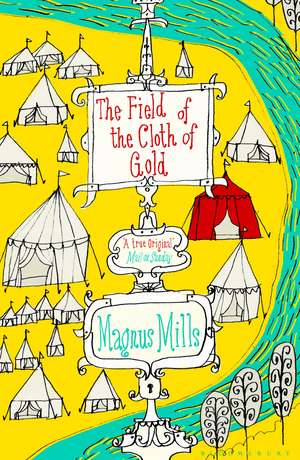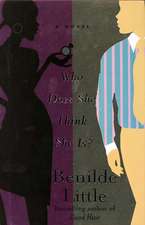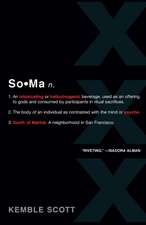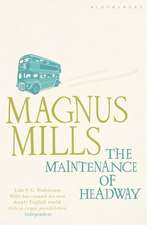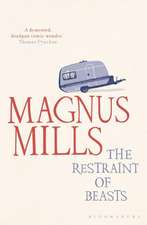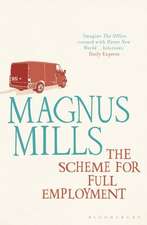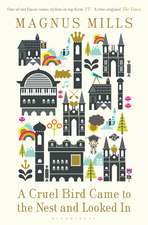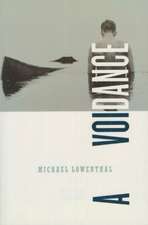The Field of the Cloth of Gold
Autor Magnus Millsen Limba Engleză Paperback – iun 2016
Preț: 60.95 lei
Preț vechi: 81.43 lei
-25% Nou
Puncte Express: 91
Preț estimativ în valută:
11.66€ • 12.22$ • 9.64£
11.66€ • 12.22$ • 9.64£
Carte disponibilă
Livrare economică 21 martie-04 aprilie
Livrare express 06-12 martie pentru 38.14 lei
Preluare comenzi: 021 569.72.76
Specificații
ISBN-13: 9781408860045
ISBN-10: 140886004X
Pagini: 224
Dimensiuni: 129 x 198 x 17 mm
Greutate: 0.19 kg
Editura: Bloomsbury Publishing
Colecția Bloomsbury Paperbacks
Locul publicării:London, United Kingdom
ISBN-10: 140886004X
Pagini: 224
Dimensiuni: 129 x 198 x 17 mm
Greutate: 0.19 kg
Editura: Bloomsbury Publishing
Colecția Bloomsbury Paperbacks
Locul publicării:London, United Kingdom
Caracteristici
'Magnus Mills is Britain's most original writer, so forget everything you've been told about fiction - he has never even heard of the rules that apply to everyone else' The Times
Notă biografică
Magnus Mills is the author of A Cruel Bird Came to the Nest and Looked In and six other novels, including The Restraint of Beasts, which won the McKitterick Prize and was shortlisted for both the Booker Prize and the Whitbread (now the Costa) First Novel Award in 1999. His most recent novel, A Cruel Bird Came to the Nest and Looked In, was published to great critical acclaim. His books have been translated into twenty languages. He lives in London.
Recenzii
Another mythic, mercurial world, a utopia that increasingly reveals its own fragility . Fans will revel in his bone-dry comic prose, a narrative voice that is both casual and knowing. In one patch of grass, Mills triumphantly displays his own idiosyncrasies and peculiarities; as literary experiments go, it's a memorable one
Magnus Mills's work is always charming, timeless and slightly at a tangent to reality, making us view our own world through fresh eyes. This short, slight novel is, in essence, a parable about our fall from Eden and man's essential biddability
Very funny . One of the distinguishing features of Mills's prose is the way it flirts with whimsy without ever succumbing to it. Like all the great comic stylists - which Mills certainly is - the books are often pretexts for exercises in 'pure word music', a phrase coined by Douglas Adams to describe the joy of reading Wodehouse . The Field of the Cloth of Gold is another joyful performance of 'pure word music' from one of Britain's most original, inimitable writers
We've come to recognise what is distinctively Millsian: a plot that is slightly absurd, possibly allegorical, written in prose that is simple, stylish and deadpan. All is present and correct in this, his eighth novel ****
Another of his trademark, pitch-perfect, blackly funny fables . all this oddness seems to be peculiarly familiar and utterly endearing. It is archetypal Mills, still ploughing his own fabulous literary furrow, which has led Thomas Pynchon to describe him as "a demented, deadpan comic wonder" ... The literary world's most original voice
Master of comic deadpan Magnus Mills invites us to observe the nuanced etiquette of settlers in the "Great Field" . The story starts with news of a surplus of milk pudding, and this sets the tone for the texture of the prose itself: emphatically bland, yet surprisingly nourishing if taken with a pinch of salt . It's quite an achievement
Magnus Mills is unique. There is simply no equivalent of his brand of domestic absurdism. Partly this is a matter of style, the unmistakably deadpan voice concealing the precise construction of each book, each sentence even, under an artless veneer. But the distinctiveness also reflects his preoccupations . Mills is the most British of anarchists, something that his brilliantly crafty seventh novel, The Field of the Cloth of Gold, makes explicit
He's original, he's eccentric - and I predict that Magnus Mills will still be fascinating his admirers 100 years from now . The surrealism works because the story is anchored firmly in human emotions, and told with Mills' trademark off-the-wall comedy. I loved this bag of bizarreness
Slightly absurd, possibly allegorical, written in simple, stylish, deadpan prose, each as singular, witty and engaging as its predecessor . So what is it all about? Is it a fable? A parable? An allegory? A bit of fun? All four? Part of the pleasure of reading Mills is trying to work out what he is getting at, if he is getting at anything at all. I would say that anyone with a grasp of history will nod along and anyone with a sense of the present will anxiously check the sky for storm clouds
Magnus Mills's work is always charming, timeless and slightly at a tangent to reality, making us view our own world through fresh eyes. This short, slight novel is, in essence, a parable about our fall from Eden and man's essential biddability
Very funny . One of the distinguishing features of Mills's prose is the way it flirts with whimsy without ever succumbing to it. Like all the great comic stylists - which Mills certainly is - the books are often pretexts for exercises in 'pure word music', a phrase coined by Douglas Adams to describe the joy of reading Wodehouse . The Field of the Cloth of Gold is another joyful performance of 'pure word music' from one of Britain's most original, inimitable writers
We've come to recognise what is distinctively Millsian: a plot that is slightly absurd, possibly allegorical, written in prose that is simple, stylish and deadpan. All is present and correct in this, his eighth novel ****
Another of his trademark, pitch-perfect, blackly funny fables . all this oddness seems to be peculiarly familiar and utterly endearing. It is archetypal Mills, still ploughing his own fabulous literary furrow, which has led Thomas Pynchon to describe him as "a demented, deadpan comic wonder" ... The literary world's most original voice
Master of comic deadpan Magnus Mills invites us to observe the nuanced etiquette of settlers in the "Great Field" . The story starts with news of a surplus of milk pudding, and this sets the tone for the texture of the prose itself: emphatically bland, yet surprisingly nourishing if taken with a pinch of salt . It's quite an achievement
Magnus Mills is unique. There is simply no equivalent of his brand of domestic absurdism. Partly this is a matter of style, the unmistakably deadpan voice concealing the precise construction of each book, each sentence even, under an artless veneer. But the distinctiveness also reflects his preoccupations . Mills is the most British of anarchists, something that his brilliantly crafty seventh novel, The Field of the Cloth of Gold, makes explicit
He's original, he's eccentric - and I predict that Magnus Mills will still be fascinating his admirers 100 years from now . The surrealism works because the story is anchored firmly in human emotions, and told with Mills' trademark off-the-wall comedy. I loved this bag of bizarreness
Slightly absurd, possibly allegorical, written in simple, stylish, deadpan prose, each as singular, witty and engaging as its predecessor . So what is it all about? Is it a fable? A parable? An allegory? A bit of fun? All four? Part of the pleasure of reading Mills is trying to work out what he is getting at, if he is getting at anything at all. I would say that anyone with a grasp of history will nod along and anyone with a sense of the present will anxiously check the sky for storm clouds
